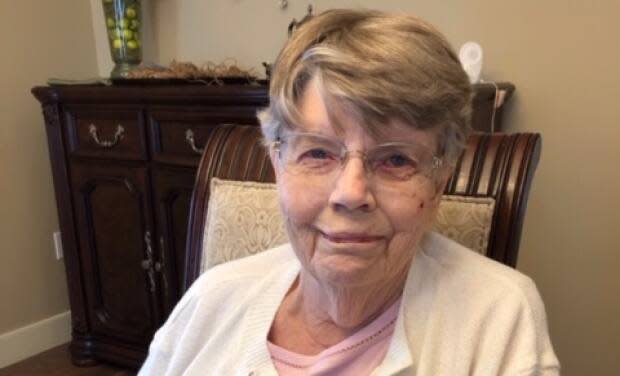Grief, loss, anger: A call for change to seniors' care
It's been said the COVID-19 pandemic has lifted the veil to reveal some of the horrors that have existed at many of Canada's long-term care facilities.
Advocates for improved care and standards — and a shift away from institutional care for seniors — believe now is the time to demand change.
"This generation deserves way more than they're getting," said Leslie Peers, who says her mother, Marilyn Hindmarch, received substandard care during a five-week stay at a long-term care facility in Edmonton.
The stay was brief but fraught with fear, anger and regret for the family.
Peers has joined a new group calling itself FACE, which stands for Families Advocating for Compassionate Eldercare.
The group is urging the provincial government to make a series of changes at privately run seniors homes that receive public funding, including improved staffing models with a set ratio of one health-care aide for every five residents.
Peers believes the ratio at her mother's former care home was one health-care aide for every 15 residents.
FACE is also calling for more accountability and enforcement for care-home operators who violate provincial standards and regulations that govern long-term care and supportive living facilities.

Two days after her arrival at the publicly funded, privately run facility in March 2019, Hindmarch fell and broke three ribs. Less than two weeks later, another fall left her with a fractured pelvis.
Hindmarch, who was 84, was dealing with several medical conditions including dementia when she moved into the facility and was separated from her husband of 67 years.
Peers brought her mother's situation to the attention of Health Minister Tyler Shandro, who met with the family in September 2019.
The matter was also raised in the legislature by the Official Opposition.
The family filed a complaint with the Protection of Persons in Care, which found in a preliminary report that staff failed to properly document the injuries and notify senior staff about Hindmarch's injuries and symptoms.
An X-ray was ordered for Hindmarch 26 hours after her first fall, when she suffered broken ribs, even though she said she had pain on the left side of her torso, that it hurt when she breathed.
The report stated health-care aides did not report those symptoms to Hindmarch's physician and no one offered to call 911. The incident was not reported to Alberta Health as required.
The preliminary investigation recommended the facility update its fall prevention strategies and post-fall policies.
Twelve days later, Hindmarch fell again and fractured her pelvis. A preliminary investigation revealed staff didn't document the incident properly or relay Hindmarch's report of pain and evidence of bruising to a physician.
A third investigation revealed several pressure sores on Hindmarch that were not documented, assessed or monitored.
Peers says the family made the decision to move her mother out of the facility and she stayed with her mom for five days before the move to another centre was finalized because she felt her mother was not safe.
They transferred her to a private facility where she was reunited with her husband. Their final stay together was brief as Hindmarch died three months later.
'I want it out there for everybody to see'
Crystal McAteer says 2019 was also a year filled with anxiety, fear, anger and personal loss.
As mayor of the Town of High Level, Alta., she led her community through a state of emergency when it was threatened by the Chuckegg Creek wildfire.
The fire forced the evacuation of a number of areas, including a long-term care home in Manning, where her father, Henry Lawrence, was a resident. He was airlifted to an acute care facility in Fairview.
McAteer says her father's condition rapidly deteriorated after he developed a bed sore that became infected.

He was eventually returned to his care home in Manning, where a doctor told McAteer the infection may have been the result of lengthy exposure to soiled adult diapers, she says.
Lawrence stayed in Fairview for about four weeks before he was transferred back to the long-term care home in Manning. He died five days later at the age of 88.
She believes her father's death is the result of the poor care that he received. McAteer says the staff at the acute care hospital may have been overwhelmed following the arrival of seven high need patients who were transferred to the facility.
An investigation by Protection of Persons in Care found in a preliminary report that Lawrence did not receive adequate nutrition or medical attention during his stay at the acute care facility, which resulted in "serious bodily injury."
McAteer, as one of the founders of FACE, is imploring the government to improve seniors' care in Alberta.
"We want compassionate care and we want accountability," McAteer said from her home in High Level.
McAteer says she has several questions, including how often her father was changed, how his bedsore was treated, how often he was bathed and how long did he have to sit in dirty adult diapers.
"My dad must have laid in his Depends for over 12 hours at a time. That's just not humane," she said.
Improved seniors' care
In addition to improved staffing at continuing care facilities, FACE wants to see "strengthened legislated penalties" for service providers who fail to meet care and accommodation standards. It would also like to see unannounced inspections of facilities and steep fines for operators who are found to be non-compliant, and it wants those inspection reports made public.
It's also pushing for a shift away from institutional care and wants the government to fund personal care homes at the same per-resident level as long-term care facilities.
It wants the government to "immediately implement innovative pilot projects through the province to move beyond the one-model system of institutional care for seniors."
Personal care homes
Edmonton-based ExquisiCare is an example of a privately run facility where residents receive no government funding. The company offers assisted living, long-term and palliative care in "purpose built" homes for up to 10 people in a residential setting.
The company's president and CEO says the government should put the needs of seniors first by allowing continuing care subsidies to follow the person, not the facility.
"Right now, unfortunately, we don't fit into the government-funded system," said Dawn Harsch.
"For people who want to live in a smaller, more home-like environment, they should still be supported by their government to live where they want to live," said Harsch.
But at $8,000 per month, it's an expensive option.

Lorie Grundy knows firsthand what it's like for her family to lose government funding for her mother, but it was a decision they took on their own after her 100-year-old mother suffered physical abuse at a publicly funded long-term care home in Edmonton.
Dorothy Forbes's arms were bruised and cut from her wrists to her shoulders during an incident with a health-care aide in February. Grundy believes it happened at bed time when Forbes was being asked to get changed into her pyjamas.
"I wheeled mum up to the desk on the unit and asked the nurse, 'what happened?'
"And she looked at them [her mother's arms] and she was quite taken aback and she said, 'I don't know,'" said Grundy.
The family moved Forbes to a private facility operated by ExquisiCare nine days later. The $5,700 monthly government subsidy was discontinued and the family is now paying $7,900 per month.
Grundy would like the government to make the subsidy available for everyone regardless of whether they choose publicly funded, privately run facilities or fully private personal care homes.
"The government subsidy should be provided to every Alberta citizen who needs long-term care," she said.

FACE launched its website this month and is hoping people sign the petition that demands the government make changes to improve patient care.
In an email to the CBC, a spokesperson for Alberta Health says the government is reviewing continuing care legislation "to ensure we have the framework in place to protect those in care."
The spokesperson said other work includes a separate review "of the facility-based continuing care system" in light of the COVID-19 pandemic which has "disproportionally impacted continuing care facilities."
Leslie Peers knows her group faces a monumental challenge trying to convince the government to make changes.
"I think we just said, 'we have to do this,'" she said.
"A lot of us are doing it in honour of our parents who have passed away."
"They cared about their communities. They cared about others. And so, in my particular case, my father advocated all the time for people who needed support, needed a voice, for they didn't have it. So, in some ways, it's his legacy that I am following through on," said Peers.
Bryan Labby is an enterprise reporter with CBC Calgary. If you have a good story idea or tip, you can reach him at bryan.labby@cbc.ca or on Twitter at @CBCBryan.


